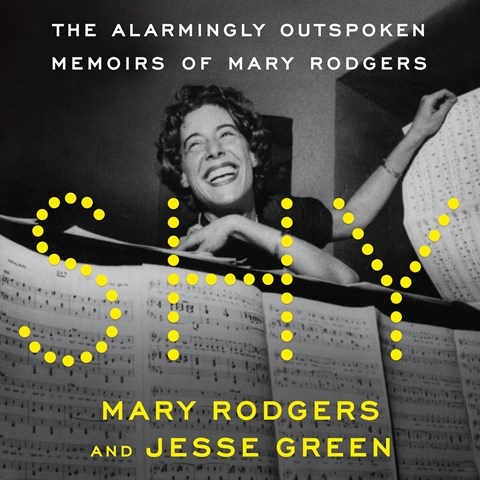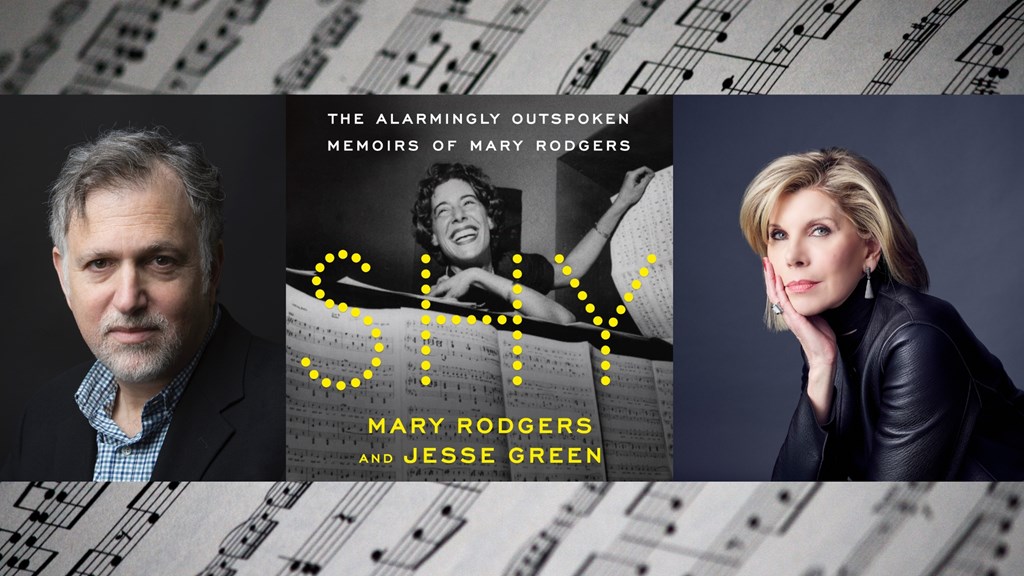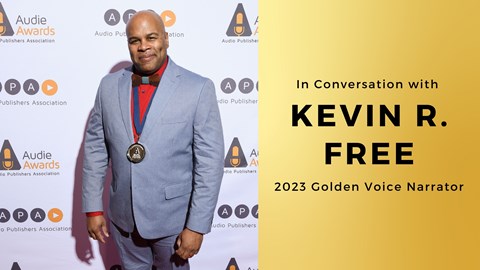Actor Christine Baranski and New York Times theater critic Jesse Green join host Jo Reed in a special bonus edition of Behind the Mic. The two teamed up to create the audiobook of SHY: The Alarmingly Outspoken Memoirs of Mary Rodgers, written by Mary Rodgers and Jesse Green.
 Mary Rodgers was the daughter of the composer Richard Rodgers and was a musical theater composer herself, as well as an author, philanthropist, and mother of six children. She was a funny, honest, and self-effacing woman who knew everyone in American musical theater and worked with quite a few. American musical theater in its golden age was her orbit, and her life begged for a memoir. Thankfully, she wrote one in collaboration with Jesse Green, who completed it after her death in 2014. As much a portrait of a smart and talented woman trying to carve out a creative life for herself as it is an insider's look at musical theater in the mid-twentieth century, the book is a tour-de-force. The audiobook is brought to life by the award-winning actor Christine Baranski in what amounts to a terrific one-woman show, while Jesse Green himself narrates the footnotes. Listen in as Jo Reed interviews Christine and Jesse about crafting this lively audiobook.
Mary Rodgers was the daughter of the composer Richard Rodgers and was a musical theater composer herself, as well as an author, philanthropist, and mother of six children. She was a funny, honest, and self-effacing woman who knew everyone in American musical theater and worked with quite a few. American musical theater in its golden age was her orbit, and her life begged for a memoir. Thankfully, she wrote one in collaboration with Jesse Green, who completed it after her death in 2014. As much a portrait of a smart and talented woman trying to carve out a creative life for herself as it is an insider's look at musical theater in the mid-twentieth century, the book is a tour-de-force. The audiobook is brought to life by the award-winning actor Christine Baranski in what amounts to a terrific one-woman show, while Jesse Green himself narrates the footnotes. Listen in as Jo Reed interviews Christine and Jesse about crafting this lively audiobook.
Partial transcript:
Jo Reed: Christine, I wonder, what was your first thought when you were offered this audiobook to record?
Jesse Green: Offered? She was begged!
Christine Baranski: I thought that it would be a great privilege, and I thought I would wind up spending time with the most extraordinary people through Mary and her memories of all these extraordinary people—that I would then be in Mary's living room, like Jesse, and there she was with Daddy and then with Mummy and with Steve and with Lenny and, you know, it's a just a dream, as Jesse said. She just literally had the most intimate relationships with the most extraordinary talents. So I loved it because in addition to reading Mary's book about four times, I was reading the Richard Rodgers biography and reading about Rodgers and Hammerstein, and I just got to spend time with all these geniuses.
JF: When you hear it as an audiobook, it's like a one-woman show.
CB: It is. That was the challenge of it, because it's written in the first person, although you want it to be as conversational as possible, nobody speaks that long. I said to Jesse, "I'm going to pretend I'm sitting across from you and I'm just talking." But, you know, for 400 and some pages, that's where your challenge is.
JR: Well, Jesse, as you wrote the book in Mary’s voice—were you thinking of a one-woman show? Were you thinking about it theatrically?
JG: When I was taking all of my hundreds of pages of notes and trying to figure out how to structure the book, one of the things that I knew from the beginning was that it had to be dominated by Mary's voice, which I knew intimately by that point, that that's what I wanted readers to hear, and that's oddly enough what she wasn't able to produce herself when she tried to write parts of the book before I came onto it. And so, in a way, I thought I was writing a radio drama or something like that. And which is why it makes wonderful sense that it becomes an audiobook finally, but also, I was treating her as, as she and I had discussed, as a character in a drama who happened to have this real life that she lived, but to write her, give her stories a shape that would be dramatic and that would sustain you over the course of a very long, very detailed, very eventful life. And so, what Christine is talking about was she had to then take what was essentially a kind of drama and pull it apart, I imagine, in the way she would a role that she was taking on for live theater.
JR: Christine, you’re taking us through hundreds of pages in the voice of Mary Rodgers. What was the process of getting to the heart of her for finding that voice?
CB: I think the wonderful thing about her, her voice and her character, was she was very direct about life, and she narrated or wrote this book at a time in her life where she wasn't going to pull any punches. And she didn't strike me as someone who was sentimental ever in her life. There's something very matter of fact and dry and, as you said, a really risqué sense of humor. I mean, I wish I had a voice that was at least an octave lower so I could do that. But I realize that if I attempted to affect that kind of deep Bacall-type voice, that smoker's voice, let's say—
JG: Mm-hmm.
CB: I didn't want it to be an affect; it had to be coming naturally over the course of all those hundreds of pages, I had to just be speaking. But, you know, I just spent time over every chapter, sure. And I thought, okay, what is the essence? This is Mary's girlhood. This is her marriage. This is the loss of her son. Some of that stuff is very emotional. And yet, I don't want to say she's not an emotional person, but she is very, very direct, she's not one to be emotionally indulgent.
JG: It's interesting. It's almost as if she had learned the Acting 101 lesson of, you know, don't play the subtext.
CB: Yeah, let other people cry. Don't you cry. I had to put that chapter down several times when I read about the death of her son. I put the book down. I couldn’t keep reading it. Today, I actually looked at it again in anticipation of this interview, and was just paging through the chapters reminding myself. And I came to that chapter and I once again, I put it down. It’s just so harrowing but it's, when you narrate it, and the way it's written, there are no violins playing. It is what it is. And I think that's the strength of it. That's the strength of her personality. She just lived through a great deal and she just kept going and not commenting on her feelings, just get on with it. Stop feeling, just do. There's something to that effect in the book.
JR: There’s no self pity.
CB: No.
JR: The chapter of her son's death is harrowing. And with a book that everyone describes rightly as, oh this is so much fun, you’re going to have a blast! There are moments that really are painful, none more so than the death of her son. And that's a real tonal shift in the book, as it should be. And as you said, Christine, it was difficult to narrate.
CB: Well, because she wouldn't have broken down and cried. You’d think, "Oh, an actress gets to do a chapter where, you know, she lives through it." And I had to keep reminding myself, "No, you can't. You have to be Mary. You can't be Christine." Because I just sobbed my way through the book.
JG: Well, Mary had learned a lesson early in life. I mean, I'm not sure that this wonderful quality of hers, you know, came from such a happy source.
JR: No.
JG: One of the reasons she was so unsentimental and did not cry, even in telling that story, she absolutely remained dry when she told it to me, is because she felt that she could not cry in front of her mother, that it made her too vulnerable to her mother's aggression. And there's a lot of stories about that in the book, and as a result, she told me, she never cries at sad things, and I never did see her cry at anything sad. She only would cry at happy things, particularly, she said, and I loved this, when people unexpectedly did something very kind. Now, that speaks in part to the rarity of that having happened in her life, particularly her childhood. But it's also kind of a wonderful philosophy to be more moved by happy things, good things, people behaving well, than the opposite.
Christine Baranski photo courtesy of the publisher. Jesse Green photo by Earl Wilson.





